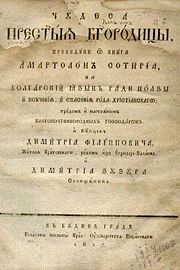
Joakim Karchovski
Encyclopedia
align="justify">Yoakim Karchovski , was a Bulgarian priest, teacher, writer and an important figure of the Bulgarian National Revival
. In his writings, he self identified as Bulgarian, though besides contributing to Bulgarian literature, in the Republic of Macedonia he is also thought to have laid the foundation of the Macedonian literary tradition.
Karchovski was born in the village of Oslomej
, Ottoman Empire, (today in Republic of Macedonia
) around 1750 and died in 1820. This spreader of enlightenment is the author of four books written in "the plainest Bulgarian language". He devoted all his life to the cause of education and stayed in history as a person who worked for the establishment of a literary language comprehensible for the common populace. His books were typed between 1814 and 1817 in Buda
:

These books were among the first printed Bulgarian books written in modern Bulgarian language
after Nedelnik of Sophronius of Vratsa
.
Bulgarian National Revival
The Bulgarian National Revival , sometimes called the Bulgarian Renaissance, was a period of socio-economic development and national integration among Bulgarian people under Ottoman rule...
. In his writings, he self identified as Bulgarian, though besides contributing to Bulgarian literature, in the Republic of Macedonia he is also thought to have laid the foundation of the Macedonian literary tradition.
Karchovski was born in the village of Oslomej
Oslomej
Oslomej is a village in the Republic of Macedonia. It is the seat of Oslomej Municipality and the birthplace of Yoakim Karchovski....
, Ottoman Empire, (today in Republic of Macedonia
Republic of Macedonia
Macedonia , officially the Republic of Macedonia , is a country located in the central Balkan peninsula in Southeast Europe. It is one of the successor states of the former Yugoslavia, from which it declared independence in 1991...
) around 1750 and died in 1820. This spreader of enlightenment is the author of four books written in "the plainest Bulgarian language". He devoted all his life to the cause of education and stayed in history as a person who worked for the establishment of a literary language comprehensible for the common populace. His books were typed between 1814 and 1817 in Buda
Buda
For detailed information see: History of Buda CastleBuda is the western part of the Hungarian capital Budapest on the west bank of the Danube. The name Buda takes its name from the name of Bleda the Hun ruler, whose name is also Buda in Hungarian.Buda comprises about one-third of Budapest's...
:

- 1814 "A narration about the formidable and second advent of Christ, composed from various Holy Scriptures and translated into plainest Bulgarian language which is used for the sake of the most common and illiterate people" („Повест ради страшнаго и втораго пришествия Христова").
- 1817 "Trials" („Сия книга глаголемаа митарства"). On the frontpage, the great man of enlightenment mentions the Macedonian cities which helped the issuing of the book: "Kratovo, Kriva Palanka, Sechishta and other Bulgarian cities".
- 1817 "The Wonders of the Holy Virgin translated from Amartolon Soteria into Bulgarian" („Чудеса пресвятия Богородици")
- 1819"Some edifyingly advices" („Различна поучителна наставления")
These books were among the first printed Bulgarian books written in modern Bulgarian language
Bulgarian language
Bulgarian is an Indo-European language, a member of the Slavic linguistic group.Bulgarian, along with the closely related Macedonian language, demonstrates several linguistic characteristics that set it apart from all other Slavic languages such as the elimination of case declension, the...
after Nedelnik of Sophronius of Vratsa
Sophronius of Vratsa
Saint Sophronius of Vratsa , born Stoyko Vladislavov , was a Bulgarian cleric and one of the leading figures of the early Bulgarian National Revival....
.

